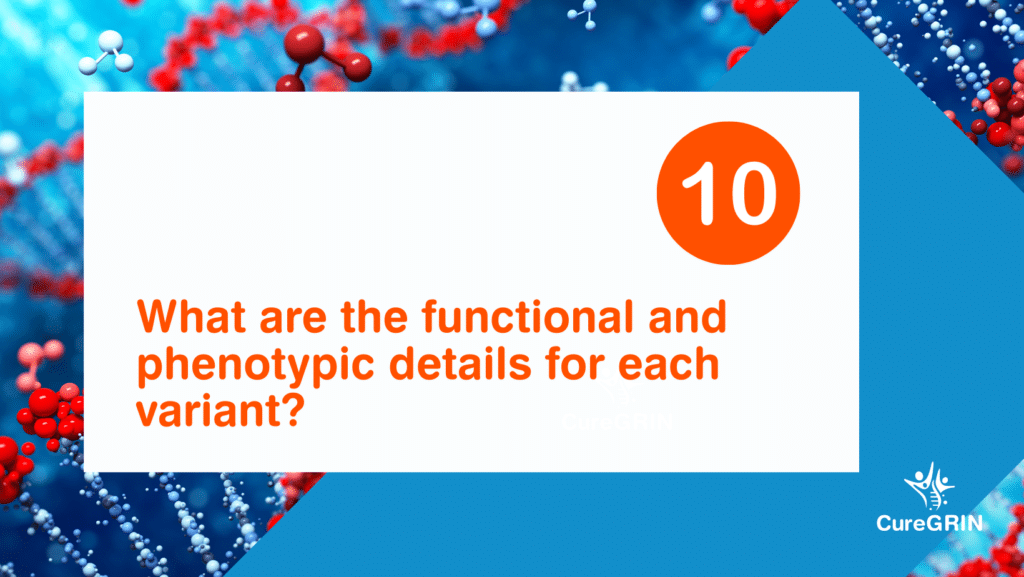Essential Question 10: What are the functional and phenotypic details for each variant?
Share This Post

Each week throughout the summer, CureGRIN has shared a blog post that summarized one of the 10 “Essential Questions” that need to be answered in order to find cures and treatments for GRIN Disorder. These questions are a central component of our recently unveiled Research Roadmap titled, “Treat the Symptoms. Cure the Disease.” You can find links to all of these blog posts here.
Today, we share the final blog post, where we focus on Essential Question 10:
What are the functional and phenotypic details for each variant?
Functional analysis is a type of test that is used to determine if a variant is Loss of Function (LoF) or Gain of Function (GoF). LoF variants are variants that result in a change to the gene product (protein) that has either less functioning than normal or no function. GoF variants are variants resulting in the gene product (protein) having either a stronger effect than normal or a different function. It is useful to know if a GRIN or other GRI gene variant is LoF or GoF because the mechanics of the variant is crucial to determine potential treatments. For improved diagnosis and effective treatment, we need a better understanding of the function of GRIN and other GRI gene variants.
CureGRIN wants to better understand the function of every GRIN or other GRI gene variant and what the resulting phenotypes (i.e., common traits and symptoms) are for each variant.
Numerous research groups are working to uncover the function of GRIN and other GRI gene variants. For example, Dr. Stephen Traynelis, a member of CureGRIN’s Scientific Advisory Board, leads the Center for Functional Evaluation of Rare Variants (CFERV) in Atlanta, GA, USA. One of CFERV’s many goals is to work to provide functional test results on all glutamate receptor variants (GRIN, GRIA, GRIK, and GRID) to stratify patients and ultimately understand subgroups for natural history (i.e., the expected course of a disorder). In 2020, CureGRIN awarded a $75,000 grant to CFERV to cover the cost of functional analysis for 50 patients with GRIN Disorder.
Additionally, the Barcelona GRIN team, which includes Dr. Xavier Altafaj, a member of CureGRIN’s Scientific Advisory Board, runs the GRIN variants database. The GRIN variants database aims to provide functional annotation of GRIN variants and compile all existing annotations of GRIN variants.
Furthermore, Dr. Johannes Lemke, a member of CureGRIN’s Scientific Advisory Board, leads the GRIN database. The GRIN database aims to provide data on variants, functions, and phenotypes for GRIN1, GRIN2A, GRIN2B patients.
Dr. Lemke, Dr. Traynelis, and colleagues are also involved in a new project called the GRIN Portal, which aims to provide information on GRIN Disorder and describe variant interpretation and classification. Other goals of the GRIN Portal include recruiting patients for the worldwide GRIN registry, visualizing registry data, and connecting researchers, clinicians, and families.
The GRIN Registry is essential for capturing patient phenotype information. Dr. Lemke leads the Europe, Asia, Africa and other chapter of the GRIN Registry, whereas Dr. Tim Benke, another member of CureGRIN’s scientific advisory board, as well as Dr. Kristen Park and Dr. Jennifer Bain, lead the North America, South America, and Australia chapter. Both groups are collecting data on genetic variants, clinical history, family history, and epilepsy features and are merging the data.
The data collected from the GRIN Registry will be important for conducting natural history studies. Natural history studies involve collecting information about the course of a particular disease. Moreover, natural history studies follow the disease progression from the onset of the disease until the disease is cured or treated. The FDA notes that natural history studies are helpful for developing safe and efficacious treatments for rare diseases, such as GRIN and other GRI disorders.
CureGRIN plans to continue to support researchers conducting functional analysis studies and phenotypic studies on identified variants across the GRI genes. Additionally, we do not know exactly how the brain’s architecture is changed by GRIN and other GRI gene variants. CureGRIN plans to partner with researchers and clinicians to do further analysis on existing animal models, perform natural history studies, and establish a brain donation program for GRIN Angels, to better understand changes in the human brain.
Read more Posts

GRIConnect
CureGRIN will be launching GRICONNECT, our new online virtual community.

